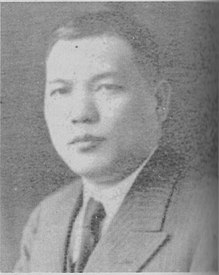Huang Shaoxiong
| Huang Shaohong | |
|---|---|
| 黃紹竑 | |

Huang Shaohong
|
|
| Governor of Hubei | |
|
In office 1936–1937 |
|
| Preceded by | Yang Yung-t'ai |
| Governor of Zhejiang | |
|
In office 1937–1946 |
|
| Preceded by | Chu Chia-hua |
| Personal details | |
| Born | 1895 |
| Died | 1966 |
| Nationality | Han chinese |
| Political party | Kuomintang |
| Alma mater | Guangxi Military Cadre Training School |
| Military service | |
| Allegiance |
|
| Years of service | 1924–1945 |
| Rank | general |
| Commands | General in the National Revolutionary Army |
| Battles/wars | Xinhai Revolution, Northern Expedition, Second Sino-Japanese War, Chinese Civil War |
| Huang Shaohong | |||||||
| Traditional Chinese | 黃紹竑 | ||||||
|---|---|---|---|---|---|---|---|
| Simplified Chinese | 黄绍竑 | ||||||
|
|||||||
| Transcriptions | |
|---|---|
| Standard Mandarin | |
| Hanyu Pinyin | Huáng Shàohóng |
Huang Shaohong (1895 – August 31, 1966) was a warlord in Guangxi province and governed Guangxi as part of the New Guangxi Clique through the latter part of the Warlord era, and a leader in later years of the Republic of China.
Huang, a Hakka, was born in 1895 in Rong County, Guangxi, China. After the 1911 revolution he attended Guangxi Military Cadre Training School in Guilin along with Bai Chongxi and Li Zongren. Later he rose to command the Model Battalion, a modern professional military formation equipped with machine guns.
In the confused power struggles following the Ao-Gui Wars, local military figures began to carve out territory in Guangxi and dominate it. In the southwest were the opium trails from both Yunnan and Guizhou that ran through Baise and then down the river to Nanning, from whence opium usually went out through Wuzhou, where the trade was financed.
During the Ao-Gui wars Huang, then the commander of the Model Battalion, attempted to stay neutral and relocated to Baise in the far northwest. By stages he came to control Baise, and with it the opium trade. Later he expanded his control to Wuzhou, thus locking up the portals through which opium both entered and left Guangxi. By the spring of 1924 the new Guangxi Clique had formed and created the Guangxi Pacification Army. Li Zongren was the Commander-in-Chief, Huang the deputy Commander and Bai Chongxi the Chief of Staff. By August they had defeated and driven former ruler Lu Rongting and other contenders out of the province and Huang became the civil governor of Guangxi from 1924-29. He was also interior and transportation minister in the National Government of Chiang Kai-shek after 1927.
...
Wikipedia
